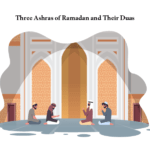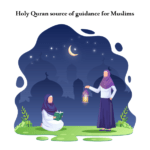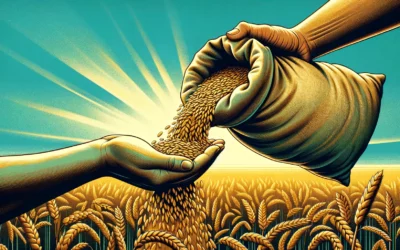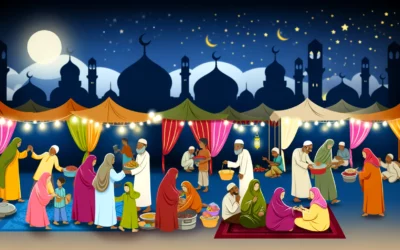What is Ramadhan?
Ramadhan is the most sacred month of the year in Islamic culture. For Muslims, it’s a time for spiritual reflection and growth, to help those in need, and to spend time with loved ones. It’s also a time when Muslims worldwide fast during daylight hours for the whole month of Ramadhan.
It is the ninth month of the Lunar Calendar. In the month of Ramadhan, Allah sent an Angel to Prophet Muhammad (SAW) to reveal the Holy Book Quran in 610 AD.
It is narrated in the Quran,
شَهْرُ رَمَضَانَ ٱلَّذِىٓ أُنزِلَ فِيهِ ٱلْقُرْءَانُ هُدًى لِّلنَّاسِ وَبَيِّنَٰتٍ مِّنَ ٱلْهُدَىٰ وَٱلْفُرْقَانِ
The month of Ramadhan [is that] revealed the Quran, a guidance for the people and clear proofs of guidance and criterion.
(AlQuran 2:185)
Three Ashra (Stages) of the Blessed Month
According to a narration, Almighty Allah has divided Ramadhan into three Ashra. The first ten days reflect the mercy of Almighty Allah; the other ten days represent the forgiveness of Almighty Allah, while the last ten days represent safety from the fire of Hell.
The three stages of Ramadhan are described below:
First Ashra of Ramadhan
The First Ten Days of Ramadhan are the days of mercy, and every person or Muslim must seek the mercy of Almighty Allah on these days. The dua for the first Ashra is:
رَّبِّ اغْفِرْ وَارْحَمْ وَأَنتَ خَيْرُ الرَّاحِمِينَ
O! My Allah, forgive and have mercy, and You are the best of Merciful.
Second Ashra of Ramdhan
The next ten days include the 11th to 20th of Ramadan, the second Ashra. It is the time to seek forgiveness, and a Muslim must seek to repent for his acts and recite as much Astagfar as he can.
Dua for Second Ashra
أسْتَغْفِرُ اللهَ رَبي مِنْ كُلِ ذَنبٍ وَأتُوبُ إلَيهِ.
“I ask forgiveness of my sins from Allah, my Lord, and I turn towards Him.”
Third Ashra of Ramadhan
The last ten days are about to seek refuge from the Hellfire, and everyone must seek refuge by reciting the dua.
Dua for third Ashra,
اَللَّهُمَّ أَجِرْنِي مِنَ النَّارِ
“O, Allah! Save me from the fire.”
What is the purpose of Ramadhan?
During Ramadan, Muslims plan to develop deep insight and become nearer to Allah and their friends and family. By fasting and avoiding joys like smoking, drinking and sex among dawn and dusk every day. Ramadan is additionally a period for solidarity, and otherworldly reflection and Muslims invest energy imploring, presenting the Quran and carrying out beneficial things. They give to reasonable cause, invest energy with friends and family, and abstain from lying, meddling and battling.
Why do Muslims fast during Ramadhan?
Fasting is significant during Ramadan as it permits Muslim to give themselves their confidence, draw nearer to Allah and learn persistence and sympathy. It’s tied to sustaining your spirit instead of zeroing in on your actual body. It’s likewise one of the Five Pillars of Islam which are the groundwork of how Muslims carry on with their lives (the others are confidence, supplication, noble cause and journey to the holy city of Mecca).
Fasting is generally finished by all Muslims except those who are debilitated, pregnant, lactating, discharging, old or voyaging. If you miss fasting days, you can compensate for them consistently.
The act of fasting is intended to help Muslims remember the less lucky and support that they should be grateful for. As one of the five points of support, or obligations, of Islam, fasting during the period of Ramadan is mandatory for all adult Muslims.
How long is Ramadhan?
Ramadan follows the lunar cycle; it endures 29-30 days, contingent upon when the following bow moon is seen.
Scientific benefits of Ramadhan
Ramadan is an extraordinary time for reflection, personal development, thoughtfulness and otherworldliness – and fasting is one of the vital mainstays of the Holy Month, with those noticing Ramadan fasting from first light to nightfall.
Here is a portion of the positive effects fasting can have on your wellbeing and prosperity:
-
Directs ‘terrible’ cholesterol
Many individuals expect to lose some weight by fasting. Nonetheless, a new report observed that fasting likewise influences the lipid profile. This outcome of diminished blood cholesterol can keep respiratory failures, strokes and different infections under control.
-
Checked hunger
Noticing Ramadan and fasting gives your way of life and stomach related framework a positive U-turn. As your body becomes accustomed to eating less, your stomach related framework has an opportunity to rest, and your stomach steadily shrivels. It decreases your hunger, and the outcomes can endure longer than many patterns and eats fewer carbs.
-
A drawn-out detox
Fasting utilizes your fat stores yet scrubs your group of destructive poisons that may be available in fat stores. With the stomach related framework on a drawn-out upgrade, your body detoxifies typically, allowing you to proceed with a better way of life past Ramadan.
-
Supported disposition and mental clearness
Fasting can be a technique for ‘supercharging’ the cerebrum, expanding the development and advancement of new synapses, like honing reactions to data in our general surroundings. Concentrates likewise show that fasting can make the mind stronger to push, more versatile to change, and can further develop disposition, memory, and learning limit in any event.
How to improve health in Ramadan
Here are a few ways to improve your health in Ramadhan,
- Have a healthy iftar
- Make Suhoor wholesome
- Stay hydrated
- Exercise moderately
- Pick up Healthy
What are the Ramadan Traditions?
When it comes to Ramadan traditions, you may find certain similarities in how they are practised worldwide. While some of the ideas continue as before, there are unpretentious contrasts in the ceremonies related to Ramadan in light of the local area.
A portion of these Ramadan rehearses has been kept alive for ages. These well-established traditions and customs of Ramadan introduce themselves as recognizable qualities of various Muslim people groups all over the planet.
It is a gander at how a portion of the worldwide practices adds to Ramadhan festivities in the Muslim world.
Essential events occurring during Ramadhan
The month of Ramdhan has countless significance and virtues. Here we will discuss a few critical events that occurred in Ramadan.
- 2 Ramadan, the Torah was bestowed on Moses according to Islam.
- 10 Ramadan, death of Khadija bint Khuwaylid, the wife of Muhammad.
- 12 Ramadan, the Gospel was bestowed on Jesus according to Islam.
- 15 Ramadan, birth of Hasan ibn Ali.
- 17 Ramadan, death of Aisha bint Abu Bakr – a wife of Muhammad.
- 17 Ramadan, the Battle of Badr.
- 18 Ramadan, the Psalms (Zabur) were bestowed on David (Dawood).
- 19 Ramadan, Caliph Ali was struck on the head during prayer by an assassin with a sword.
- 20 Ramadan, the Conquest of Mecca by Muhammad.
- 21 Ramadan, Caliph Ali was martyred.
- 27 layalatul qadr
- Five blessed nights
- the Conquest of Makkah 10-20 Ramazan
- Imam al Bukhari died (30 ramadan or 1st shawal)
- Imam ibn Majah died

















